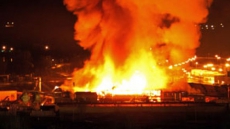VANCOUVER — While experts and officials decry recent instances of vigilantism by the hacktivist group Anonymous, one beneficiary of the group's activism is adamant that justice would never have been served without involvement by the clandestine organization.
Glen Canning said he believes Anonymous' threats to publicly identify boys allegedly involved in the cyberbullying that predated his daughter Rehtaeh Parsons' death prompted Halifax police to reopen their investigation and eventually lay charges.
None of this would have happened if Anonymous hadn't stepped in, said Canning. "I believe that absolutely. I have no question about that at all."
Her family alleges Parsons was sexually assaulted in November 2011 and bullied for months when a digital photo of the assault was passed around her school. She died after attempting suicide in 2013. An angry post from Parsons' mother brought the case to the attention of Anonymous, said Canning.
"Why go through the courts? Why go through the system?" he said in a telephone interview from Nova Scotia. "Why be revictimized again when you can write something and get ahold of some people online who can really do a hell of a lot more to bring you a sense of justice than the police and the courts can?"
Anonymous is a shadowy, loosely knit collective known for its online activism targeting governments, corporations and religious groups around the world on prominent social justice issues.
The group made headlines last month after one of its alleged members was shot and killed by police in Dawson Creek, in northern British Columbia.
Reacting to the shooting, Anonymous threatened to temporarily shut down police websites and release hacked government documents related to the overseas communication capabilities of Canada's spy agency.
The RCMP national site and the website for Dawson Creek both went down briefly after the threat. Mounties later said it was a maintenance issue.
The group threatened to go public with more "stunning secrets" unless the government named and charged the RCMP officers involved in the shooting of James McIntyre, 48. B.C.'s police watchdog is investigating the shooting.
Bystander video revealed McIntyre was wearing Anonymous' trademark Guy Fawkes mask. Fawkes was the most well-known member of a plot to blow up the British Parliament in 1605.
"Stuff like this happens because the system is broken," said Canning. "If we can fix the system ... then maybe we wouldn't need Anonymous."
Dalhousie University law professor and cyberbullying expert Wayne MacKay said Anonymous has played a role in advancing the cause of justice, such as spurring governments to take action. Though no government would concede publicly it had acted in response to pressure from Anonymous, he added.
Still, MacKay raised a red flag about the group's unorthodox style of activism.
"Even if they're filling a hole in our justice system does that justify breaking the law?" he said.
"Often the answer to that would be no. We do have a structured justice system for a reason and we shouldn't necessarily allow a sort of vigilante response even if we think the main justice system is moving too slowly."
Central to the dilemma is a concept found right in the collective's name: anonymity.
MacKay described the members as unelected and unaccountable purveyors of justice.
"Because they're anonymous and hide behind masks they're not responsible or accountable for what they do," he said.
Former B.C. Court of Appeal justice and provincial attorney general Wally Oppal was unapologetic in his condemnation of the group's methods.
"There's no excuse for vigilantism," he said in an interview. "It's a recipe for anarchy."
He chided the activist group for failing to give investigators enough time to probe the Dawson Creek shooting.
Oppal said the public is justified in feeling frustration with delays in the justice system, but there needs to be a process based on fairness.
Anonymous claimed responsibility for a June attack that shut down several federal sites and wreaked havoc with email — billing it as a protest against the federal security legislation that broadened the mandate for Canada's spy agency.
There is obviously interest in "trying to identify these hackers, it goes without saying," said Public Safety Minister Steven Blaney last week.
"All the agencies involved in security ... we'd really like to be able to put an end to this.''





